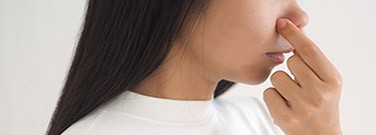Mucus: The Body’s Natural Barrier

By Mike Howie
Snot, boogers, nose gold — there are plenty of names for mucus, but why is it there? Whether congested with a cold or experiencing a runny nose on a cold day, you may have thought to yourself at some point, “Hmm, what does this stuff actually do?”
The short answer is that it’s a kind of shield. Mucus protects sensitive parts of your body that are exposed to air but not protected by skin, like your eyes, throat, lungs, and digestive tract. Not only does mucus keep those areas moist, but it also catches unwanted substances like dirt, bacteria, and viruses that could make you sick or cause an infection.
A Sticky Barrier
When you inhale, you may be breathing in more than just air, particularly if you’re in a dusty or dirty environment. You could also be breathing in pollen, for example, which might cause an allergic reaction. Or perhaps you could breathe in germs that could make you sick. Without mucus, those irritants would have an unimpeded path into your body.
Mucus is mostly made of water, along with salt and proteins called mucins that are covered in sugar molecules. The mucins have a negative electrical charge that attracts other molecules.
That makes mucus kind of like flypaper for tiny intruders. In the nose, it catches pollen, germs, and other microscopic particulates before they have a chance to get too far into your body. But then, of course, it has to go somewhere.
Within your nose, there are microscopic hairlike structures called cilia that move mucus toward either the throat or the front of the nose. Mucus that goes toward the throat is eventually swallowed, sometimes without you even noticing, and is broken down in the stomach. And any mucus that goes toward the front of the nose can easily be blown into a tissue and thrown away.
The mucus deeper inside the body, particularly the phlegm in your lungs, operates similarly. Think of when you’ve had a cold or flu that makes you cough. Sometimes a bit of phlegm will come up to remove irritants from the lungs. Basically, mucus provides a method for your body to destroy or remove harmful contaminants.
The Wide World of Goo
Mucus extends far beyond humans — many animals produce it, too. Even the family dog can come down with a runny nose or a phlegmy cough.
But there are also creatures that use mucus as more than just a protective barrier. For example, snails secrete a mucus that helps them get around, both pushing off and gliding on top of it. Some sea creatures, like hagfish and jellyfish, use it as a weapon to defend against predators. And biologists suspect that dolphins use mucus to make the clicking noise they use to find and hunt their prey.
Can mucus be funny? Sure, sometimes. Can it be gross, embarrassing, and annoying? Absolutely. But it’s also a critical part of the body that helps us stay safe and healthy. In that respect, mucus is pretty cool.

